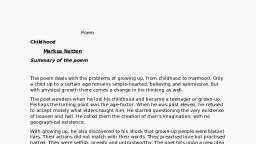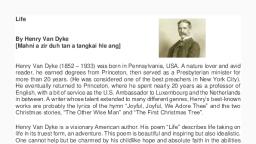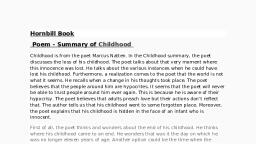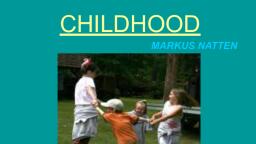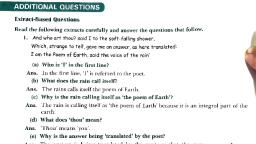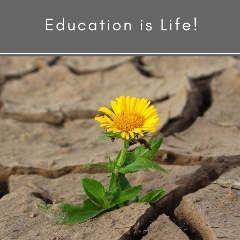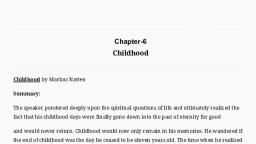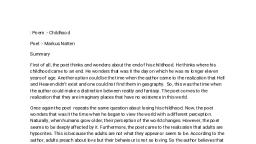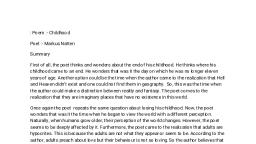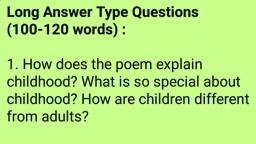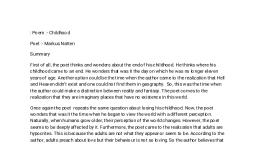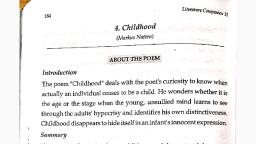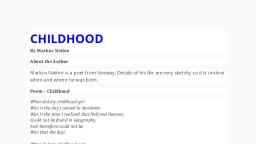Page 1 :
Poem, Childhood, Markus Natten, Summary of the poem, , The poem deals with the problems of growing up, from childhood to manhood. Only a child up to a, certain age remains simple-hearted, believing and submissive. But with physical growth there comes a, change in his thinking as well., The poet wonders when he lost his childhood and became a teenager or grown-up. Perhaps the turning, point was the age-factor. When he was past eleven, he refused to accept mutely what elders taught, him. He started questioning the very existence of heaven and hell. He called them the creation of man’s, imagination, with no geographical existence., With growing up, he also discovered to his shock that grown-up people were blatant liars. Their actions, did not match with their words. They preached love but practised hatred. They were selfish, greedy and, untrustworthy. The poet hits upon a new idea about when he ceased to be a child and became an adult., It was when he began to think freely and even differently from others. He began to judge people and, their words critically. Such confidence gave him a sense of maturity. But none of the alternatives, satisfies the poet. He realises that it is impossible to become simple and trusting like a child. Childhood is, a stage, a beginning. Once you have crossed the border-line, you become so-called worldly-wise and, even wicked., , Central Idea of the poem, Childhood is written by Marcus Natten. In this poem, the poet thinks over his lost childhood. He, wonders about the moment where he lost his innocence and realized that the world is not what he, seemed it to be. He recalls when his thoughts changed and he realized the hypocrisy of the people, around him. He finally settled down to the idea that his childhood went to some forgotten place and is, hidden in the face of an innocent infant., Short Answer Type Questions (30 to 40 words), , 1. Give the theme and central idea of the poem Childhood., Ans. The theme of the poem is the process of growing up, from childhood to adulthood. The childhood,, the heavenly period of innocence, lasts until one becomes a teenager. This transition brings about a, radical change in one’s physique and understanding., 2. What loss does the poet Markus Natten regret? What does he speculate?
Page 2 :
Ans. Natten regrets the loss of his childhood, his childlike purity and innocence. He wonders where he, lost it, perhaps when he crossed eleven and developed a questioning attitude. Now he realised that, heaven and hell were imaginary things. He also noticed that grown-ups were blatant liars. They talked of, love but practised hatred. Finally, he started thinking freely and differently from others., 4. What are the three hallmarks of growing up, according to Natten?, , Ans. (i) The ability to see the difference between facts and fiction, between right and wrong., , (ii) Hypocrisy. Grown-ups become hypocrites. They talk about the brotherhood of mankind but they do, not act on that principle., , (iii) The ability to use one’s mind independently., 5. What are the poet’s search and questioning? Does he get a satisfying answer?, , Ans. The poet has lost his childlike innocence. He wonders when he outgrew his childhood and where he, left it behind. After some analysis and guesses, he gets the only answer to his question. Only a child has, the privilege to remain simple, honest and clean. As one grows up in years one becomes dishonest., Childhood lies hidden in the face of an infant.

